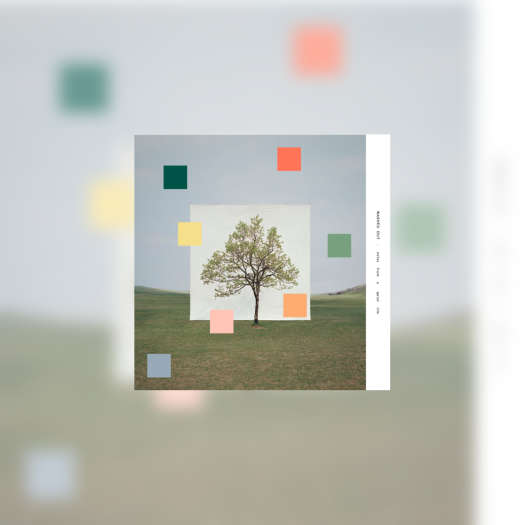"I need to keep fucking up so I can make my second album," Miya Folick said shortly after the release of her debut full-length Premonitions. Thankfully, the turbulence of life always provides inspiration for songwriters, leaving us with Roach: a visceral guidebook on navigating the dizzying path of young adulthood, with all its fears and uncertainty.
Continuing from where her 2007 EP left off, Roach sees Folick merge its six tracks into a larger zig-zagging narrative as she details her most intimate struggles with fearless candour. "Oh God" opens the album like a plunge in the cold pool, a choir of otherworldly falsetto gasping the title as both a plea for spiritual guidance and dismay over her decisions. Beginning with a moment of panic makes it clear that she's yearning for change. In the last chorus, a new vocal layer joins in a quiet scream, which later grows loud enough to exorcize demons on "Get Out of My House." Its punky drumbeat and buzzy 2010s indie guitar add burgeoning urgency, each repetition of the title an incantation to banish both her suffocating ex-lover and the feelings of self-doubt they instilled. In a burst of exhilarating liberation, Folick regains confidence in real time as she realizes she no longer "needed your glow / Needed you to be home," but can find more warmth within herself as "sunshine / Streaming out of my two eyes."
In being alone, Folick is free, but her solitude opens space to ruminate on uncomfortable past experiences. The rowdy guitar of "Get Out of My House" is abruptly unplugged and replaced with a messy acoustic throb on "Nothing to See," her regained self-worth fizzling into shame over losing herself by attempting to win over someone else. Yet, her anger is directed inward. Every "why did I do that?" feels self-flagellatory, and her plea to be looked at is an appeal for accountability as she sedately proclaims "there's nothing to see here," rising to a desperate wail in the last chorus. This isn't the only moment on Roach where drastically contrasting songs sit next to each other — a deft picture of the emotional tug-of-war of your late twenties and early thirties.
While searching for the answers, Folick often looks to her elders for guidance. Whether she "told my mom it was the last time" chasing hedonism on "Bad Thing," wondering if she should "call my mom and say I'm moving home" on "Oh God," or feeling justified by her mother's relief over moving on in "Nothing to See," Folick finds safety in parental comfort and uses it to frame her own experiences. As she summons the courage to brave the world alone on "2007," she realizes that this was the last year she felt safe — then she corrects herself: it was 2001. Folick is less concerned with cutting the umbilical cord than she is with understanding how to age without fully distancing herself from girlhood, realizing that innocence and maturity aren't exclusive to certain phases of life, that "I'm a little girl with a woman's past."
While her mother sits in the background of these scenes, it's the intimate, aching "Mommy" where Folick directly grapples with ancestry as she wonders "Where do my parents end and where do I begin?" Softly gliding in over eerie synths and fingerpicked acoustic guitar, Folick sounds angelic as she runs through loving recollections of her mother, later describing her father as someone who "always wanted everyone to like him / I think I'm just like him." The uneasy tension that had been building bursts into a trail of frenzied saxophone as if to mirror the discomfort of her realization — one of many moments on Roach where eclectic production by Gabe Wax (War on Drugs, Fleet Foxes) pinpoints a world of emotions.
Only at the album's midpoint does Folick mention the titular "Cockroach," a drony waltz that gradually clambers into chaos. "I'm a fucking cockroach and you can't kill me," she sings calmly with a snarl, before a taunting string of "crush me"s laced with the unspoken knowledge that nobody can. It feels like both the album's thesis and turning point, as from here, Folick becomes willing to tackle what's eating at her — even if that means only reaching acceptance. The somber "Tetherball" finds her "curled up like a roach in the dark," asking for another start. And this time, she's more eager than ever to begin again.
Though she stills feels anger and fear, "Cartoon Clouds" sees Folick literally looking outwards at a beautiful day, asking herself "what's the point in being down about it?" over airy, glitchy synthpop. "Doesn't it feel good to feel good?" she asks, only to repeatedly answer her question with mantra-like conviction: it "feels good to feel good." Rays of light shine through on the glitzy, sparkling "So Clear," where she realizes after "ten thousand days" — as in, the late-twenties — fucking up is necessary to incite change. At this point, Folick looks back at the first half of the album with a fresh, wisened perspective. In doing so, it feels euphoric to see the extent of her growth. Her false promise of turning down "fake friends and chemical temptations" on "Bad Thing" becomes real on "Shortstop," where she advises to "quit that juul, quit that drink / Get some new friends." She asks us to meet her at the bar, but "no need to get fucked up" — a positive change that's worth a night of celebration.
Miya Folick is well-aware of who and what dulls her light, and on Roach, she finds the strength within her to not only regain her spark, but to build it into a fireball. While the album doesn't necessarily provide clarity on how to survive young adulthood (if only it were that easy!), Folick makes it clear that feeling small and vulnerable is the driving force behind building enough strength to look "in the eyes of a stranger / Who told me I'd be nothing alone" and say "no, no, just watch me go." Go ahead and try to crush her — she knows she'll survive.
(Nettwerk)Continuing from where her 2007 EP left off, Roach sees Folick merge its six tracks into a larger zig-zagging narrative as she details her most intimate struggles with fearless candour. "Oh God" opens the album like a plunge in the cold pool, a choir of otherworldly falsetto gasping the title as both a plea for spiritual guidance and dismay over her decisions. Beginning with a moment of panic makes it clear that she's yearning for change. In the last chorus, a new vocal layer joins in a quiet scream, which later grows loud enough to exorcize demons on "Get Out of My House." Its punky drumbeat and buzzy 2010s indie guitar add burgeoning urgency, each repetition of the title an incantation to banish both her suffocating ex-lover and the feelings of self-doubt they instilled. In a burst of exhilarating liberation, Folick regains confidence in real time as she realizes she no longer "needed your glow / Needed you to be home," but can find more warmth within herself as "sunshine / Streaming out of my two eyes."
In being alone, Folick is free, but her solitude opens space to ruminate on uncomfortable past experiences. The rowdy guitar of "Get Out of My House" is abruptly unplugged and replaced with a messy acoustic throb on "Nothing to See," her regained self-worth fizzling into shame over losing herself by attempting to win over someone else. Yet, her anger is directed inward. Every "why did I do that?" feels self-flagellatory, and her plea to be looked at is an appeal for accountability as she sedately proclaims "there's nothing to see here," rising to a desperate wail in the last chorus. This isn't the only moment on Roach where drastically contrasting songs sit next to each other — a deft picture of the emotional tug-of-war of your late twenties and early thirties.
While searching for the answers, Folick often looks to her elders for guidance. Whether she "told my mom it was the last time" chasing hedonism on "Bad Thing," wondering if she should "call my mom and say I'm moving home" on "Oh God," or feeling justified by her mother's relief over moving on in "Nothing to See," Folick finds safety in parental comfort and uses it to frame her own experiences. As she summons the courage to brave the world alone on "2007," she realizes that this was the last year she felt safe — then she corrects herself: it was 2001. Folick is less concerned with cutting the umbilical cord than she is with understanding how to age without fully distancing herself from girlhood, realizing that innocence and maturity aren't exclusive to certain phases of life, that "I'm a little girl with a woman's past."
While her mother sits in the background of these scenes, it's the intimate, aching "Mommy" where Folick directly grapples with ancestry as she wonders "Where do my parents end and where do I begin?" Softly gliding in over eerie synths and fingerpicked acoustic guitar, Folick sounds angelic as she runs through loving recollections of her mother, later describing her father as someone who "always wanted everyone to like him / I think I'm just like him." The uneasy tension that had been building bursts into a trail of frenzied saxophone as if to mirror the discomfort of her realization — one of many moments on Roach where eclectic production by Gabe Wax (War on Drugs, Fleet Foxes) pinpoints a world of emotions.
Only at the album's midpoint does Folick mention the titular "Cockroach," a drony waltz that gradually clambers into chaos. "I'm a fucking cockroach and you can't kill me," she sings calmly with a snarl, before a taunting string of "crush me"s laced with the unspoken knowledge that nobody can. It feels like both the album's thesis and turning point, as from here, Folick becomes willing to tackle what's eating at her — even if that means only reaching acceptance. The somber "Tetherball" finds her "curled up like a roach in the dark," asking for another start. And this time, she's more eager than ever to begin again.
Though she stills feels anger and fear, "Cartoon Clouds" sees Folick literally looking outwards at a beautiful day, asking herself "what's the point in being down about it?" over airy, glitchy synthpop. "Doesn't it feel good to feel good?" she asks, only to repeatedly answer her question with mantra-like conviction: it "feels good to feel good." Rays of light shine through on the glitzy, sparkling "So Clear," where she realizes after "ten thousand days" — as in, the late-twenties — fucking up is necessary to incite change. At this point, Folick looks back at the first half of the album with a fresh, wisened perspective. In doing so, it feels euphoric to see the extent of her growth. Her false promise of turning down "fake friends and chemical temptations" on "Bad Thing" becomes real on "Shortstop," where she advises to "quit that juul, quit that drink / Get some new friends." She asks us to meet her at the bar, but "no need to get fucked up" — a positive change that's worth a night of celebration.
Miya Folick is well-aware of who and what dulls her light, and on Roach, she finds the strength within her to not only regain her spark, but to build it into a fireball. While the album doesn't necessarily provide clarity on how to survive young adulthood (if only it were that easy!), Folick makes it clear that feeling small and vulnerable is the driving force behind building enough strength to look "in the eyes of a stranger / Who told me I'd be nothing alone" and say "no, no, just watch me go." Go ahead and try to crush her — she knows she'll survive.




